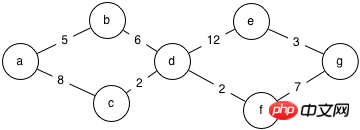我自己写了一些代码,想知道哪里出了问题,更改的代码已经写在里面了
用recursion来计算两点之间最短距离
例如有一个file
a,b,5
a,c,8
b,d,6
c,d,2
d,e,12
d,f,2
e,g,3
f,g,7通过代码能变成如图的map

读取文件和生成map的代码已经写出来了
剩下的就是如何计算a到g的最短距离,有点懵逼,没啥思路,已写代码如下哈
"""
Graph search to find shortest path between two cities.
A road map is represented as a directed graph.
Edges represent road segments and are labeled with distances.
Nodes represent cities.
Wne use depth first search to find the shortest distance
between two cities. During the depth-first search from
start to end, we compute a 'shortest known distance to here from start'
attribute for each node. After completion of depth first search,
destination city should be labeled with the shortest distance from
the start city.
"""
import argparse
def read_distances(map_file):
"""Read a distance table from a named file into a dict
mapping sources to lists of (destination, distance) pairs.
Args:
map_file: A readable text file in which each line either
begins with # (indicating a comment line) or is of the form
from location, to location, distance or time, for example
Minis Tirith,Cair Andros,5
indicating one can travel from Minis Tirith to Cair Andros in 5.0 hours.
Returns:
Dict in which each entry d[from] is a list [(to, cost), (to, cost), ... ]
where from is a location name, to is a location name, and cost is time
or distance
as a floating point number. If x,y,z appears in the input file, then
we should have both d[x] contains (y,z) and d[y] contains (x,z), i.e.,
we assume that roads are bi-directional.
"""
connections = dict()
for line in map_file:
line = line.strip()
if line.startswith("#") or line=="" :
# print("Skipping comment: ", line)
continue ## Discard and go on to next
# print("Processing line: ", line)
fields = line.split(",")
place_from = fields[0]
place_to = fields[1]
cost = float(fields[2])
if not (place_from in connections):
connections[place_from] = [ ]
connections[place_from].append( (place_to, cost) )
if not (place_to in connections):
connections[place_to] = [ ]
connections[place_to].append( (place_from, cost) )
return connections
def show_roads(roads):
"""Print roads from dict (for debugging).
Args:
roads: A dict in which
roads[Chicago] == [("Atlanta", 30.0), ("Austin", 25.0)]
means that there is a 30.0 mile road from Chicago to Atlanta and a
25.0 mile road from Chicago to Austin.
Returns:
nothing
Effects:
Prints a textual representation of the road connections
"""
for from_place in roads:
print(from_place + ":")
for hop in roads[from_place]:
to_place, dist = hop
print("\t->" + to_place + " (" + str(dist) + ")")
def dfs(place, dist_so_far, roads, distances):
"""Depth-first search, which may continue from from_place if dist_so_far
is the shortest distance at which it has yet been reached.
Args:
place: Currently searching from here
dist_so_far: Distance at which from_place has been reached
this time (which may not be the shortest path to from_place)
roads: dict mapping places to lists of hops of the form (place, hop-distance)
distances: dict mapping places to the shortest distance at which they
have been reached so far (up to this time).
"""
distances = []
dist_so_far = distances[place]
if place not in distances:
distances[place] = dist_so_far
for city,dist in road[place]:
for i in city:
dfs(i,dist_so_far,roads,distances)
else:
if distances[place]<=dist_so_far:
distances[place] = dist_so_far
#FIXME
# Consider cases:
# - We've never been at place before (so it's not in distances)
# - We've been at place before, on a path as short as this one (in distances)
# - We've been here before, but this way is shorter (dist_so_far)
# Consider which are base cases, and which require recursion.
# For the cases that require recursion, what is the progress step?
def main():
"""
Main program gets city pair and map file name,
reports distance or reports lack of connectivity.
"""
parser = argparse.ArgumentParser(
description="Find shortest route in road network")
parser.add_argument('from_place',
help = "Starting place (quoted if it contains blanks)")
parser.add_argument('to_place',
help = "Destination place (quoted if it contains blanks)")
parser.add_argument('map_file', type=argparse.FileType('r'),
help = "Name of file containing road connections and distances")
args = parser.parse_args()
start_place = args.from_place
destination = args.to_place
roads = read_distances(args.map_file)
if not start_place in roads:
print("Start place ", start_place, " is not on the map")
exit(1)
if not destination in roads:
print("Destination ", destination, " is not on the map")
exit(1)
distances = { }
dfs(start_place, 0.0, roads, distances )
if destination in distances :
print("Distance from {} to {} is {}".format(
start_place,destination, distances[destination]))
else:
print("You can't get from {} to {}".format(start_place, destination))
if __name__ == "__main__":
main()求大神啊~
Selepas bertanya GTF melalui waktu pejabat minggu lepas, saya berjaya menulis kod yang boleh dijalankan
Akhirnya, saya mendapat markah hampir penuh Kekurangannya ialah saya boleh menukar dua gelung menjadi satu. Profesor jawapan standard belum dimuat naik lagi saya akan mengemas kini selepas ia dimuat naik.
Jawapan standard adalah seperti berikut
Kod menggesa untuk menggunakan algoritma carian kedalaman pertama.
Pergi sehingga ke penghujung, pilih titik yang belum dilalui pada setiap langkah.